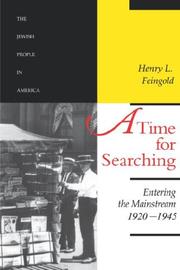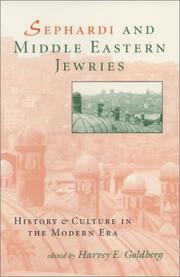| Listing 1 - 10 of 23 | << page >> |
Sort by
|

ISBN: 2866007611 9782866007614 Year: 1996 Volume: *1 Publisher: Paris Publisud
Abstract | Keywords | Export | Availability | Bookmark
 Loading...
Loading...Choose an application
- Reference Manager
- EndNote
- RefWorks (Direct export to RefWorks)
Juifs --- Marranes --- Séfarades --- Histoire --- Congrès. --- Congrès --- Espagne --- Portugal --- Relations interethniques --- Jews --- Marranos --- Sephardim --- Ashkénazes --- Nouveaux Chrétiens --- Sefardíes --- History --- Congresses. --- Acculturation --- Civilisation --- Influence --- Identité collective --- Émancipation --- Historia --- Spain --- Spanien. --- Portugal. --- Juden. --- Ethnic relations --- Séfarades --- Congrès. --- Congrès
Book
ISBN: 9781107041271 9781107669291 9781139649476 1107669294 1107041279 1139649477 1139949381 1139950436 Year: 2014 Volume: *25 Publisher: Cambridge Cambridge University Press
Abstract | Keywords | Export | Availability | Bookmark
 Loading...
Loading...Choose an application
- Reference Manager
- EndNote
- RefWorks (Direct export to RefWorks)
This is an accessible and up-to-date account of the Jews during the millennium following Alexander the Great's conquest of the East. Unusually, it acknowledges the problems involved in constructing a narrative from fragmentary yet complex evidence and is, implicitly, an exploration of how this might be accomplished. Moreover, unlike most other introductions to the subject, it concentrates primarily on the people rather than issues of theology and adopts a resolutely unsentimental approach to the subject. Professor Schwartz particularly demonstrates the importance of studying Jewish history, texts and artefacts to the broader community of ancient historians because of what they can contribute to wider themes such as Roman imperialism. The book serves as an excellent introduction for students and scholars of Jewish history and of ancient history.
Jews --- Judaism --- Juifs --- Judaïsme --- History. --- Civilization. --- Histoire --- Civilisation --- Palestine --- Judaïsme --- History --- Civilization --- HISTORY --- Jews. --- Joden. --- Judaism. --- Juden. --- Ancient --- General. --- Civilisation. --- 586 B.C.-638 A.D. --- Israel --- Middle East --- Jews - History --- Judaism - History --- Jews - Civilization --- Palestine - History
Book
ISBN: 9781107055445 110705544X 9781107699953 1107699959 9781107295292 1139905457 1139899589 1107295297 Year: 2014 Publisher: New York : Cambridge University Press,
Abstract | Keywords | Export | Availability | Bookmark
 Loading...
Loading...Choose an application
- Reference Manager
- EndNote
- RefWorks (Direct export to RefWorks)
Historical sociolinguistics is a comparatively new area of research, investigating difficult questions about language varieties and choices in speech and writing. Jewish historical sociolinguistics is rich in unanswered questions: when does a language become 'Jewish'? What was the origin of Yiddish? How much Hebrew did the average Jew know over the centuries? How was Hebrew re-established as a vernacular and a dominant language? This book explores these and other questions, and shows the extent of scholarly disagreement over the answers.
Jews --- Sociolinguistics. --- Juden. --- Soziolinguistik. --- Sprache. --- Jews. --- Languages --- History. --- Languages. --- Language and culture --- Linguistics --- Sociology --- Integrational linguistics (Oxford school) --- Hebrews --- Israelites --- Jewish people --- Jewry --- Judaic people --- Judaists --- Ethnology --- Religious adherents --- Semites --- Judaism
Book
ISBN: 9782503551159 2503551157 Year: 2014 Volume: 3 Publisher: Turnhout : Brepols,
Abstract | Keywords | Export | Availability | Bookmark
 Loading...
Loading...Choose an application
- Reference Manager
- EndNote
- RefWorks (Direct export to RefWorks)
Le judaïsme était solidement enraciné en Arabie quand Muḥammad fils de ʿAbd Allāh, le prophète de l’islam, s’est engagé dans une nouvelle voie. On le sait par les auteurs de langues grecque et syriaque de l’Antiquité tardive et par la Tradition arabo-musulmane. Par ailleurs, depuis l’islamisation de l’Arabie, il y a toujours eu des juifs, principalement au Yémen.Cependant, on a d’ordinaire considéré ces sources manuscrites, recopiées avec des erreurs, corrigées, remaniées, amplifiées et parfois falsifiées, avec une grande suspicion. On a notamment douté que le Yémen antique (le royaume de Ḥimyar) ait été juif et que ses rois aient dominé une grande partie de l’Arabie. Depuis une cinquantaine d’années, les recherches archéologiques apportent des confirmations et des correctifs. La découverte de dizaines d’inscriptions et de graffites au Yémen et dans le Ḥijāz en Arabie séoudite a mis en évidence que le judaïsme s’était enraciné en Arabie dès les premiers siècles de l’ère chrétienne et qu’il était dominant au Yémen à partir du IVe s., et probablement plus tôt dans certaines oasis du Ḥijāz. Le christianisme, qui a eu de nombreux adeptes dans les îles du golfe Arabo-persique et sur les côtes, ne s’est propagé au Yémen que tardivement dans quelques régions périphériques. Le judaïsme de l’Arabie antique dresse le premier inventaire exhaustif de toutes les données disponibles. Il tente également de dépasser cette première étape en mettant en évidence une série de petits faits qui permettent de s’interroger sur la nature du judaïsme qui s’est répandu en Arabie à partir du IIe s.
Judaism --- Judaïsme --- History --- Congresses --- Histoire --- Congrès --- Interfaith relations. --- Juden. --- Arabian Peninsula --- Arabian Peninsula. --- Ethnic relations. --- Islam --- Islam. --- Jews --- Jews. --- Judaism. --- Judentum. --- Relations --- Arabien. --- Ethnic relations --- Arabia --- Congresses.
Book
ISBN: 3110492652 3110494574 311049194X 9783110494570 9783110492651 9783110491944 Year: 2017 Volume: 501 Publisher: Berlin De Gruyter
Abstract | Keywords | Export | Availability | Bookmark
 Loading...
Loading...Choose an application
- Reference Manager
- EndNote
- RefWorks (Direct export to RefWorks)
Philo von Alexandria, der etwas ältere Zeitgenosse des Paulus, ist der wichtigste Repräsentant des alexandrinischen Judentums. An der Schnittstelle von biblischer Überlieferung sowie platonischer und stoischer Philosophie bieten die Schriften Philos eine ganz eigenständige jüdische Anthropologie und Kosmologie, Eschatologie und Ethik. Otto Kaiser, emeritierter Alttestamentler an der Philipps-Universität Marburg und einer der besten Kenner des jüdischen Schrifttums der hellenistisch-römischen Zeit, führt mit dieser Aufsatzsammlung in das Denken und die Schriftauslegung Philos ein. Er bietet eine Übersicht über Philos Verständnis des jüdischen Kultes, zumal des Jerusalemer Hohepriesters und Tempels, und skizziert Philos Hochschätzung des Gebets und der Tugend. Dabei verortet Kaiser Philo im Kontext der hellenistischen Philosophie und analysiert Philos Antworten auf die Grundfragen menschlicher Existenz wie Gesundheit und Krankheit, Hoffnung und Verzweiflung, Tod und Überwindung des Todesgeschicks. The volume presents studies by the Marburg Old Testament scholar Otto Kaiser on the works of the Jewish religious philosopher Philo of Alexandria in the context of intellectual and cultural history. They examine issues of Jewish Biblical exegesis along with Philo’s anthropology and cosmology, his understanding of ritual and prayer, and his ideas about living a virtuous life and overcoming death.
1 <=924> PHILO ALEXANDRINUS <01> --- 1 <=924> PHILO ALEXANDRINUS <01> Joodse filosofie:--oudheid en middeleeuwen--Bibliografieën. Catalogi--PHILO ALEXANDRINUS --- Joodse filosofie:--oudheid en middeleeuwen--Bibliografieën. Catalogi--PHILO ALEXANDRINUS --- Philo, --- Alexandria, --- Filon --- Filón, --- Filon, --- Filone, --- Philon, --- Philonis, --- Yedidyah, --- פילון --- פילון מאלכסנדריה --- פילון, --- פילון היהודי --- Филон Александрийский --- Filon Aleksandriĭskiĭ --- Pseudo-Philo --- Frühjudentum --- Hellenistische Juden --- RELIGION / Judaism / History. --- Judentum --- Hellenismus --- Juden --- Spätjudentum --- Spätjudentum --- Metaphors. --- cult. --- exegesis. --- virtue.
Book
ISBN: 0674015924 9780674015920 Year: 1992 Publisher: Cambridge (Mass.): Harvard university press
Abstract | Keywords | Export | Availability | Bookmark
 Loading...
Loading...Choose an application
- Reference Manager
- EndNote
- RefWorks (Direct export to RefWorks)
"This narrative history surveying one thousand years of Jewish life integrates the Jewish experience into the context of the overall culture and society of medieval Europe. It presents a new picture of the interaction between Christians and Jews in this tumultuous era." "Alienated Minority shows us what it meant to be a Jew in Europe in the Middle Ages. The story begins in the fifth century, when autonomous Jewish rule in Palestine came to a close, and when the papacy, led by Gregory the Great, established enduring principles regarding Christian policy toward Jews. Kenneth Stow examines the structures of self-government in the European Jewish community and the centrality of emerging concepts of representation. He studies economic enterprise, especially banking; constructs a clear image of the medieval Jewish family; and portrays in detail the very rich Jewish intellectual life." "Analyzing policies of Church and State in the Middle Ages, Stow argues that a firmly defined legal and constitutional position of the Jewish minority in the earlier period gave way to a legal status created expressly for Jews, who in the later period were seen as inimical to the common good. It was this special status that paved the way for the royal expulsions of Jews that began at the end of the thirteenth century." "Kenneth Stow has given us an authentic and multidimensional picture of medieval Jewry and its place in European history. He is Professor of Jewish History, University of Haifa."--BOOK JACKET.
Middeleeuwen --- Middle Ages --- Moyen Âge --- Moyen-Âge --- Jews --- Judaism --- Middle Ages. --- History --- Social conditions. --- History. --- -Jews --- -Judaism --- -Middle Ages --- Europe --- -Dark Ages --- History, Medieval --- Medieval history --- Medieval period --- World history, Medieval --- World history --- Civilization, Medieval --- Medievalism --- Renaissance --- Religions --- Semites --- Hebrews --- Israelites --- Jewish people --- Jewry --- Judaic people --- Judaists --- Ethnology --- Religious adherents --- -History --- Social conditions --- Ethnic relations --- Religion --- Judaïsme --- Juifs --- Moyen Âge. --- Christ --- Joden. --- Histoire. --- Histoire --- Conditions sociales. --- Geschichte 500-1500. --- Geschichte 400-1555. --- Geschichte 400-1500. --- Geschichte 400-1560. --- Europe, Southern --- Juden --- Europa --- Westeuropa --- Ethnic relations. --- Relations interethniques. --- Europe. --- Christ. --- Juden. --- Europa. --- Westeuropa. --- Dark Ages --- 70-1789 --- Jews - History - 70-1789. --- Jews - Europe - History. --- Judaism - Europe - History. --- Jews - Europe - Social conditions. --- Europe - Ethnic relations.
Book
ISBN: 8486047102 9788486047108 Year: 1982 Volume: vol 10 Publisher: Valladolid Ambito
Abstract | Keywords | Export | Availability | Bookmark
 Loading...
Loading...Choose an application
- Reference Manager
- EndNote
- RefWorks (Direct export to RefWorks)
Jews --- Marranos --- Spanje --- Muslims --- Juifs --- Musulmans --- Marranes --- Ethnic relations. --- Jews. --- Marranos. --- Muslims. --- Geschichte (1300-1500) --- Geschichte (1000-1500) --- Geschichte (1391-1500) --- Spain --- History. --- ethnische relaties --- History --- Ethnic relations --- Espagne --- Spain. --- Morisken. --- Spanien. --- Juden. --- Marranen. --- Relations interethniques. --- Geschichte (1300-1500). --- Geschichte (1000-1500). --- Geschichte (1391-1500). --- ethnische relaties.

ISBN: 0801843464 9780801843464 0801851238 9780801851230 Year: 1992 Volume: vol. 4 Publisher: Baltimore (Md.) : Johns Hopkins university press,
Abstract | Keywords | Export | Availability | Bookmark
 Loading...
Loading...Choose an application
- Reference Manager
- EndNote
- RefWorks (Direct export to RefWorks)
"In this fourth volume, [the author] notes that the decline of religiousness in the second and third generations of American Jews was balanced by the development of an activist political culture based an elaborate organizational life, an effective fund-raising apparatus, and Zionism, with its notion of Jewish peoplehood. That reshaping of American Jewish individual and communal identity in some measure accounts for the insufficient response to the plight of European Jews during the Holocaust. American Jewry's remarkable achievement in the private sphere overshadowed its weakness in the public one"--Series Editor's forword.
Jews --- -Jews --- -Judaism --- Religions --- Semites --- Hebrews --- Israelites --- Jewish people --- Jewry --- Judaic people --- Judaists --- Ethnology --- Religious adherents --- Judaism --- History --- -Politics and government --- -Religion --- Religion --- United States --- Ethnic relations. --- -History --- -United States --- Politics and government --- 20th century --- Ethnic relations --- Geschichte (1920-1945). --- Jews. --- Joden. --- Judaism. --- Judaïsme --- Juden. --- Juifs --- Politics and government. --- United States. --- Histoire --- 1900-1999. --- Geschichte 1920-1945. --- USA. --- États-Unis --- Jewish history. --- Relations interethniques.

ISBN: 0253210410 0253330130 9780253330130 9780253210418 Year: 1996 Publisher: Bloomington, Ind. Indiana University Press
Abstract | Keywords | Export | Availability | Bookmark
 Loading...
Loading...Choose an application
- Reference Manager
- EndNote
- RefWorks (Direct export to RefWorks)
Sephardim --- Jews --- Judaism --- History --- Congresses --- Sephardic rite --- Judaïsme --- Juifs --- Séfarades --- Joden. --- Congresses. --- Histoire --- Congrès. --- Mittelmeerraum. --- Juden. --- Herzliyya <1991> --- Sephardim. --- Herzliyya <1991>. --- History of Asia --- History of Africa --- Jewish religion --- anno 1800-1999 --- Middle East --- Mediterranean region --- Sephardim - Mediterranean Region - History - Congresses. --- Jews - Mediterranean Region - History - Congresses. --- Judaism - Sephardic rite - History - Congresses. --- Congrès
Periodical
ISSN: 15651525 15533956 Year: 2001 Publisher: Jerusalem, Israel : Bloomington, Ind. : Hebrew University, Indiana University Press
Abstract | Keywords | Export | Availability | Bookmark
 Loading...
Loading...Choose an application
- Reference Manager
- EndNote
- RefWorks (Direct export to RefWorks)
Aleph explores the interface between Judaism and science and studies the interactions between science and Judaism throughout history. Aleph features full-length articles, brief communications, and notes on recently published books, as well as studies on related subjects that allow a comparative view, such as the place of science in other cultures. Aleph is a joint publication of the Sidney M. Edelstein Center for the History and Philosophy of Science, Technology, and Medicine and the Institute for Jewish Studies, both at The Hebrew University of Jerusalem, and Indiana University Press.
Arts and Humanities --- Religion --- Society and Culture --- Judaism and science --- Judaism and science. --- Judaïstiek. --- Jodendom. --- Wetenschapsgeschiedenis (wetenschap) --- Zeitschrift --- Naturwissenschaften --- Geschichte --- Science --- Judaism --- Religion and Science. --- history. --- Juden. --- Science and Religion --- Science and Judaism --- Landesgeschichte --- Regionalgeschichte --- Ortsgeschichte --- Zeitgeschichte --- Geschichtsphilosophie --- Vergangenheit --- Naturforschung --- Naturlehre --- Naturwissenschaft --- Wissenschaft --- Naturwissenschaftler --- Periodikum --- Zeitschriften --- Presse --- Fortlaufendes Sammelwerk --- 02.01 history of science and culture. --- Judaïsme et sciences --- Religion et sciences.
| Listing 1 - 10 of 23 | << page >> |
Sort by
|

 Search
Search Feedback
Feedback About UniCat
About UniCat  Help
Help News
News